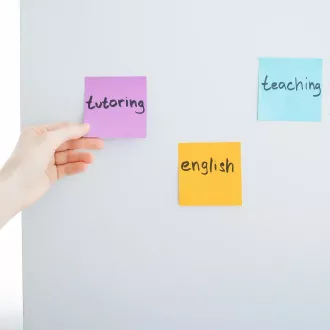Usos del verbo [to get]
Usos comunes del verbo «to get»
En este punto, aprenderás los usos más comunes del verbo «to get», el cual es uno de los verbos más polisémicos del idioma inglés, es decir, que presenta un gran número de significados. En primer lugar, veremos ejemplos de sus usos más comunes atendiendo a sus diferentes significados, luego pasaremos a enumerar las principales «phrasal verbs» que se pueden construir con él, y por último conocerás algunas expresiones populares con este verbo.
Principales Usos
| Uso | Ejemplo en Español | Ejemplo en Inglés |
|---|---|---|
| Obtener, recibir, conseguir | ¿Recibiste mi mensaje de texto? | Did you get my text? |
| Obtener, recibir, conseguir | Obtuve un aumento de sueldo la semana pasada | I got a raise last week. |
| Tomar un vehículo, subirse a un medio de transporte | No es fácil coger un taxi en esta parte de la ciudad | It’s not easy to get a taxi in this part of the city. |
| Conseguir un objeto material | ¿Dónde conseguiste ese vestido? | Where did you get that dress? |
| Llegar a un lugar | Llegaremos al hotel en dos horas | We’ll get to the hotel in two hours. |
| Entender | No entiendo lo que estás diciendo | I don’t get what you are saying. |
| Ofrecer, dar | ¿Puedo ofrecerles algo, una bebida, quizás? | Can I get you anything, a drink, perhaps? |
| Llevar o transportar algo | Ella llevará el mensaje al punto de encuentro | She will get the message to the meeting point. |
| Atrapar, coger | Atrápenlo, rápido | Get him, quickly. |
| Contagiarse, enfermarse | Mi hermana se contagió de gripe | My sister got the flu. |
| Hacer que algo suceda | Él no ha arreglado el coche todavía | He hasn’t got the car fixed yet. |
| Atender el teléfono o la puerta | No puedo atender el teléfono ahora mismo | I can’t get the phone right now, sorry. |
| Tener la oportunidad de hacer algo | No llegué a verla una última vez | I didn’t get to see her one last time. |
| Hacerse cargo | No te preocupes, yo tengo esto controlado | Don’t worry, I’ve got this. |
| Posesión | Mi hermana tiene un juguete nuevo | My sister has got a new toy. |
Combinaciones comunes con adjetivos
- Get angry/mad: Enfadarse
- Get hot: Calentarse
- Get cold: Enfriarse
- Get thirsty: Tener sed
- Get worried: Preocuparse
- Get dirty: Ensuciarse
- Get better: Mejorar/se
- Get ill/sick: Enfermarse / ponerse malo
- Get old: Envejecer
- Get hungry: Tener hambre
- Get tired: Cansars
- Get upset: Decepcionarse
- Get together: Reunirse
- Get fit: Ponerse en forma
- Get wet: Mojarse
- Get nervous: Ponerse nervioso
- Get serious: Ponerse serio
- Get married: Casarse
- Get divorced: Divorciarse
- Get dark: Oscurecer
- Get lost: Perderse
- Get ready: Prepararse
- Get drunk: Emborracharse
Phrasal Verbs
- Get on: Montarse en un tren, autobús, avión, barco. . .
- Get off: Bajarse de un tren, autobús, avión, barco. . .
- Get in: Entrar
- Get up: Levantarse, ponerse de pie
- Get back: Regresar
- Get back at someone: Vengarse de alguien
- Get back together: Reanudar una relación
- Get over: Recuperarse de una situación difícil
- Get on with: Llevarse bien con alguien
- Get across: Comunicar exitosamente una idea
- Get by: Sobrevivir, arreglárselas
- Get through: Atravesar algo
- Get away: Escaparse
- Get away with: No ser castigado
- Get down: Deprimirse
- Get down to: Ponerse a hacer algo
- Get around: Viajar o lograr un objetivo
Expresiones Populares
- Get someone’s back: Defender a alguien. No tengas miedo, yo te cuido las espaldas / Don’t be afraid, I’ve got your back.
- Get-up-and-go: Expresión de energía. Hoy no tengo energía, estoy exhausta / I have no get-up-and-go today, I’m exhausted.
- Get that a lot: Se utiliza cuando a una persona se le dice algo repetidamente. Cantas muy bien. Si, lo sé, me lo dicen mucho / You sing very well. Yes, I know, I get that a lot.
condicional simple usos to get




